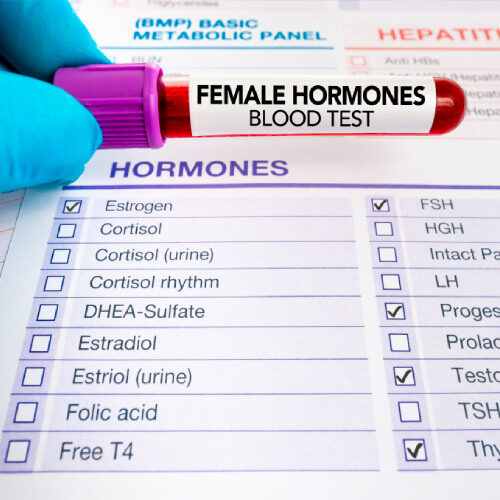Female Hormone Imbalance Therapy In San Diego

What are hormones?
Hormones are substances secreted by glands that travel through the bloodstream to their target sites, where they regulate tissue function. In simpler terms, hormones carry information to the cells and tissues in the body.
Types of female sex hormones
This article will focus on the two primary sex hormones in females: estrogen and progesterone. It is important to note that even though testosterone is typically considered a male hormone, females do produce a small amount of it too.

What is infertility?
According to the World Health Organization, infertility is defined as an inability to become pregnant after 12 months or more of attempting pregnancy through unprotected intercourse.
Primary infertility refers to a couple who has never been able to conceive, while secondary infertility is experienced by couples who have had prior pregnancies but now find themselves unable to do so again.
Causes of infertility
Infertility can be complicated and there is often more than one component at play. Some of the contributing factors may include hereditary issues, environmental and lifestyle influences such as exposure to toxins and nutrient deficiencies, as well as hormonal imbalances.
Progesterone
Progesterone is an additional sex hormone, which is released by the ovaries after ovulation.
A woman’s placenta also produces some progesterone during pregnancy.
The role of progesterone is to:
- Prepare the lining of the uterus for pregnancy
- Support pregnancy
- Regulate blood pressure
- Support healthy sleep and mood
- Balance estrogen production after ovulation

Testosterone
Women’s bodies produce small amounts of testosterone from the adrenal glands and ovaries, which play a crucial role in a variety of bodily functions, such as:
- Sexual desire
- Menstrual cycle regulation
- Bone health
- Muscle Strength
- Other hormones such as thyroid hormones, cortisol, and DHEA are essential for many bodily processes.
Symptoms of hormonal imbalances include:

- Mood swings
- Sleep problems
- Slow or rapid heartbeat
- Unexplained weight gain or weight loss.
- Fatigue
- Numbness or tingling in the hands
- Anxiety or depression
- Intolerance to cold or warm temperatures
- Thin skin
- Acne on upper back, chest, or face
- Hair loss
- Heavy periods
- Facial hair in women
- Hot flashes
- Infertility
- Irregular periods
- Loss of libido
- Vaginal atrophy
- Vaginal dryness
Causes of female hormone imbalance
A variety of factors, including genetics, medical history, toxin exposure, stress levels, and dietary habits can cause hormonal imbalances.
Major factors contributing to hormonal imbalances in women include:
- Being overweight or obese
- Food allergies/sensitivities or intolerances
- Dysbiosis, leaky gut, or other gut issues
- Genetic susceptibility
- Inflammation
- Poor sleep
- Excess stress
- Toxin exposure

Medical conditions are caused by hormone issues
Some of the most common hormone-related conditions include:
- PMS (premenstrual syndrome) – a complex set of symptoms that include mood swings, breast tenderness, food cravings, irritability and depression. These result from the interaction between hormones, neurotransmitters and psychological factors.
- Menopause – marked by the cessation of menstruation, caused by decreased production of estrogen and progesterone in the body. Most women experience the beginning of menopause between ages 50 and 55.
- PCOS (polycystic ovarian syndrome) affects around 25% of women and involves an imbalance in sex hormones; irregular periods and signs of high testosterone like facial hair can be indicators of PCOS.
- Irregular periods: Several hormones are involved in the menstrual cycle. Because of this, an imbalance in any one or several of those hormones can cause irregular periods.
- Infertility: Hormonal imbalances are the leading cause of infertility in people assigned female at birth. People assigned male at birth can also experience hormonal imbalances that affect fertility, such as low testosterone levels.
- Hormonal acne: Hormonal acne (adult acne) develops when hormonal changes increase the amount of oil your skin produces. This is especially common during pregnancy, menopause and for people who are taking testosterone therapy.

How to measure your hormones?
Serum blood tests are the most widely-used technique for evaluating hormone levels in women.
This method is considered the gold standard of testing, making it a reliable and accurate way to measure hormone levels.
Additionally, 24-hour urine collections can provide a fuller picture of hormonal changes since they take note of variations that occur throughout the day.
Unfortunately, however, research suggests that saliva testing is not accurate enough to be used to measure female hormones.
Naturopathic approaches to balancing female hormones
Identifying the source of female hormone imbalances is a crucial first step in formulating an effective treatment plan. To support estrogen metabolism, both dietary and lifestyle changes that emphasize nutrition and a healthy liver are key. It is also essential to provide the body with necessary vitamins, minerals, and enzymes for proper biochemical processes.
Furthermore, constipation can impede the gut’s ability to expel metabolites from the body, while dysbiosis or an imbalance in gut flora can lead to increased levels of beta-glucuronidase, which can cause higher concentrations of estrogen circulating in the body.

Naturopathic medicine puts a large emphasis on reducing exposure to synthetic estrogens, known as xenoestrogens. Xenoestrogens are found in an array of everyday items, including beauty and personal care products, plastic bottles and food containers, toys, and receipts. These chemicals can cause the body to struggle when attempting to remove excess estrogen from the system, creating an ultimately estrogen-dominant state in the body.
Stress is a major variable to consider when attempting to regulate female hormones. Cortisol, the hormone triggered by stress, is produced in the adrenal glands alongside estrogen, progesterone, and testosterone.
Chronic stress can lead to an overproduction of cortisol, resulting in fewer raw materials needed for the production of other hormones like progesterone. As such, building resilience to stress is an essential part of any successful plan for balancing a woman’s hormones.

What about hormone replacement therapy?
Naturopathic doctors may prescribe hormone therapy as a supplement to other treatments.
Bio-identical hormones, derived from plants, resemble the natural molecules produced by the body and can be safely replaced when hormone levels decline.
Conversely, traditional hormone replacement therapy (HRT) is derived synthetically and has been linked to burdensome liver issues and adverse side effects.
